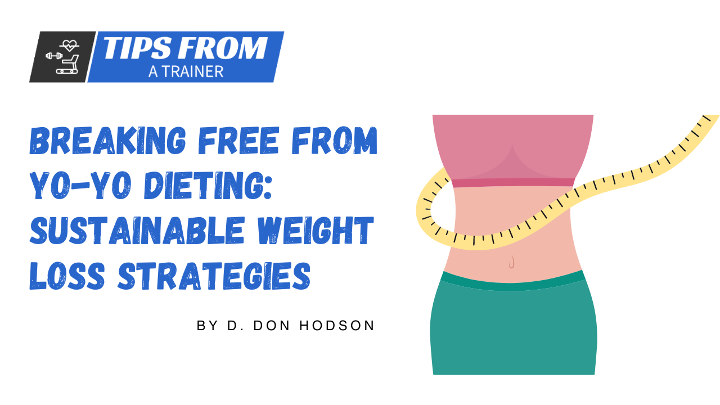Introduction
The Allure and Pitfalls of Yo-Yo Dieting
In today's fast-paced world, the allure of rapid weight loss often tempts individuals into embarking on fad diets promising quick results. The initial success of shedding pounds provides a sense of accomplishment and a glimpse of the desired body. However, the pitfalls of yo-yo dieting become evident as weight regain sets in, leaving many feeling disheartened and trapped in a cycle of fluctuating weights. The promise of a slender figure gives way to frustration and disappointment, and the quest for lasting weight loss becomes increasingly elusive.
The Need for Sustainable Weight Loss
While the appeal of rapid transformations is undeniable, the importance of sustainable weight loss cannot be overstated. True well-being goes beyond short-term aesthetics, focusing on fostering lasting health and vitality. Sustainable weight loss is not a fleeting endeavor; it is a lifelong commitment to healthy habits that nourish the body and mind. Achieving and maintaining a healthy weight is not just about shedding excess pounds; it is about embracing a comprehensive approach that enhances overall quality of life.
Purpose of the Article
The purpose of this article is to delve deep into the concept of sustainable weight loss and offer evidence-based strategies to break free from the vicious cycle of yo-yo dieting. By exploring the psychological, physiological, and behavioral aspects of weight loss, we aim to equip readers with the knowledge and tools necessary to make informed choices and embark on a journey towards lasting well-being. Through a holistic understanding of sustainable weight loss, we strive to empower individuals to reclaim control over their health, build positive relationships with food, and thrive beyond the confines of yo-yo dieting.
Table of Contents
Introduction
The Allure and Pitfalls of Yo-Yo Dieting
The Need for Sustainable Weight Loss
Purpose of the Article
Understanding Yo-Yo Dieting
The Cycle of Weight Loss and Regain
Psychological and Physiological Impact
Identifying Yo-Yo Dieting Patterns
The Science of Sustainable Weight Loss
Energy Balance and Metabolism
Nutrient-Rich, Balanced Diet
Gradual and Realistic Goals
Mindset Shift: Building a Healthy Relationship with Food
Embracing Mindful Eating
Overcoming Emotional Eating
Cultivating Self-Compassion and Body Positivity
Physical Activity for Long-Term Wellness
Exercise as a Lifestyle, Not a Quick Fix
Strength Training and Metabolic Health
Finding Enjoyable Activities
Creating Sustainable Lifestyle Habits
Prioritizing Sleep and Stress Management
Meal Preparation and Planning
Social Support and Accountability
Navigating Setbacks and Challenges
Overcoming Plateaus with Patience
Dealing with Temptations and Cravings
Seeking Professional Guidance
8. Conclusion
Embracing Lasting Change: A Journey to Sustainable Well-being
Breaking the Cycle: Thriving Beyond Yo-Yo Dieting

Understanding Yo-Yo Dieting
The Cycle of Weight Loss and Regain
Yo-yo dieting, characterized by the repetitive pattern of losing weight through restrictive diets followed by weight regain, is a cycle that affects countless individuals. The initial excitement of shedding pounds is often short-lived as the body's metabolism adjusts to reduced caloric intake, leading to a plateau and subsequent weight regain. The cycle perpetuates as the body responds to deprivation by storing fat more efficiently, making it increasingly challenging to achieve sustainable weight loss.
Psychological and Physiological Impact
Beyond the physical toll, yo-yo dieting takes a significant psychological toll. The emotional rollercoaster of hope and disappointment erodes self-esteem and may lead to feelings of failure. Physiologically, yo-yo dieting disrupts metabolic rate and can result in muscle loss, which further hinders weight loss efforts. The body's natural instinct to defend against weight loss compounds the challenge, reinforcing the cycle of weight fluctuation.
Identifying Yo-Yo Dieting Patterns
Recognizing the signs of yo-yo dieting is essential for breaking free from its grip. Common patterns include extreme caloric restriction, reliance on fad diets, and rapid weight loss followed by equally rapid regain. Identifying triggers for engaging in yo-yo dieting, such as societal pressures or emotional factors, empowers individuals to address root causes and adopt healthier approaches to weight management. Acknowledging the negative impact of yo-yo dieting on both physical and mental well-being is the first step towards embracing sustainable change.
The Science of Sustainable Weight Loss
Energy Balance and Metabolism
Sustainable weight loss revolves around the principle of energy balance—the relationship between calories consumed and calories expended. To achieve a gradual and lasting reduction in weight, the number of calories taken in must be less than the number of calories burned through physical activity and metabolism. A slight caloric deficit over time promotes fat loss while minimizing muscle loss and metabolic slowdown. Sustainable weight loss prioritizes gradual changes that allow the body to adapt and maintain a healthy equilibrium.
Nutrient-Rich, Balanced Diet
A cornerstone of sustainable weight loss is adopting a nutrient-rich, balanced diet that provides essential vitamins, minerals, and macronutrients. Focus on whole, minimally processed foods such as vegetables, fruits, lean proteins, whole grains, and healthy fats. Portion control and mindful eating ensure that caloric intake aligns with energy expenditure. Restrictive diets that eliminate entire food groups often lead to nutrient deficiencies and are unsustainable in the long term. A balanced approach supports overall health and helps prevent feelings of deprivation.
Gradual and Realistic Goals
Setting gradual and realistic weight loss goals is fundamental to breaking free from yo-yo dieting. Aim for a weight loss of about 0.5 to 1 kilogram (1 to 2 pounds) per week, which is both achievable and sustainable. Rapid weight loss may yield initial success but is often accompanied by muscle loss and metabolic adaptation. Establishing incremental milestones allows for consistent progress and fosters a sense of accomplishment. Celebrating non-scale victories, such as improved energy levels and clothing fit, reinforces positive behaviors and motivates continued efforts.
Mindset Shift: Building a Healthy Relationship with Food
Embracing Mindful Eating
Mindful eating is a practice rooted in mindfulness, encouraging individuals to bring full awareness to the eating experience. By paying attention to hunger and satiety cues, flavors, textures, and the act of eating itself, individuals can develop a deeper connection with their body's needs. Mindful eating fosters a sense of appreciation for each bite and promotes a more intuitive approach to consuming food. This shift from mindless to mindful eating helps prevent overeating, supports weight loss, and contributes to a healthier relationship with food.
Overcoming Emotional Eating
Emotional eating is a common response to stress, boredom, or other emotions, often leading to the consumption of comfort foods. Overcoming emotional eating involves recognizing triggers and finding alternative ways to cope with emotions. Cultivating emotional awareness and developing a toolbox of coping strategies—such as engaging in physical activity, practicing deep breathing, or seeking social support—empowers individuals to address emotions without turning to food. By breaking the connection between emotions and eating, sustainable weight loss becomes more achievable.
Cultivating Self-Compassion and Body Positivity
A critical aspect of sustainable weight loss is fostering self-compassion and cultivating a positive body image. Negative self-talk and unrealistic body ideals perpetuate the cycle of yo-yo dieting. Embracing self-compassion involves treating oneself with the same kindness and understanding as one would offer to a friend. Body positivity emphasizes appreciating one's body for its functionality and uniqueness, rather than focusing solely on appearance. By shifting the focus from weight to well-being, individuals can build a foundation of self-esteem and body acceptance that supports lasting change.
Physical Activity for Long-Term Wellness
Exercise as a Lifestyle, Not a Quick Fix
Physical activity plays a crucial role in achieving and maintaining overall health and well-being. It goes beyond burning calories; it supports cardiovascular health, strengthens bones and muscles, improves mood, and enhances cognitive function. Embracing exercise as a lifestyle choice rather than a temporary solution for weight loss encourages individuals to engage in activities they enjoy and can sustain over time. Regular physical activity contributes to improved fitness, reduced risk of chronic diseases, and a higher quality of life.
Strength Training and Metabolic Health
Strength training, also known as resistance training, is a key component of a well-rounded fitness regimen. Engaging in strength-building exercises, such as lifting weights or using resistance bands, promotes muscle growth and boosts metabolism. Muscle tissue requires more energy at rest than fat tissue, contributing to increased calorie expenditure even outside of workout sessions. By incorporating strength training into their routine, individuals can enhance their metabolic rate and support sustainable weight loss.
Finding Enjoyable Activities
Sustainable physical activity involves discovering enjoyable exercises that align with personal interests and preferences. Engaging in activities that bring joy and satisfaction increases the likelihood of adherence over the long term. Whether it's dancing, swimming, hiking, cycling, or practicing yoga, the key is to find activities that inspire regular participation. By embracing physical activities that are fun and fulfilling, individuals are more likely to maintain an active lifestyle, supporting their journey towards sustainable well-being.
Creating Sustainable Lifestyle Habits
Prioritizing Sleep and Stress Management
In the quest for sustainable weight loss, it's crucial to recognize the impact of sleep and stress on our overall well-being. Prioritizing adequate sleep—typically between 7 to 9 hours per night—supports hormonal balance, cognitive function, and energy levels. Sleep deprivation can disrupt appetite-regulating hormones, potentially leading to overeating and weight gain. In addition, effective stress management techniques, such as mindfulness, meditation, or engaging in hobbies, can help prevent emotional eating and support healthier choices. By fostering restful sleep and managing stress, individuals create an environment conducive to making mindful dietary and lifestyle decisions.
Meal Preparation and Planning
Meal preparation and planning are essential components of sustainable weight loss. By taking the time to plan meals and snacks in advance, individuals can make conscious choices that align with their health goals. Batch cooking and storing nutritious options in the refrigerator can reduce the temptation to opt for convenience foods high in calories and low in nutrients. Planning also helps control portion sizes and ensures a balanced intake of nutrients. Having a well-thought-out meal plan empowers individuals to make informed choices and prevents impulsive, less nutritious eating.
Social Support and Accountability
The journey towards sustainable weight loss is often more successful when shared with a support network. Friends, family members, or support groups can provide encouragement, motivation, and accountability. Engaging in activities like group workouts or healthy cooking sessions fosters a sense of community and shared commitment to well-being. Social support can help individuals stay on track, celebrate milestones, and navigate challenges. Sharing experiences and goals with others reinforces the idea that sustainable weight loss is part of a larger effort to enhance overall health and quality of life.
Navigating Setbacks and Challenges
Overcoming Plateaus with Patience
Weight loss plateaus are a common occurrence on the journey towards sustainable well-being. It's essential to understand that weight loss is not always linear, and temporary stalls are normal. Patience is key during these phases. Instead of becoming discouraged, individuals can focus on non-scale victories, such as improved energy levels, clothing fit, or increased physical stamina. Re-evaluating dietary and exercise habits, incorporating variety into workouts, or adjusting calorie intake can help break through plateaus and continue making progress.
Dealing with Temptations and Cravings
Temptations and food cravings are inevitable challenges that individuals encounter when striving for sustainable weight loss. Developing strategies to manage these moments is crucial. One approach is to practice mindfulness when cravings arise. Engage in a few moments of deep breathing or engage in a distraction, such as going for a walk or engaging in a creative activity. Identifying the difference between emotional cravings and physical hunger is also important. If a craving persists, it's acceptable to indulge occasionally while maintaining moderation and portion control.
Seeking Professional Guidance
Embarking on a journey towards sustainable weight loss can be complex, and seeking guidance from healthcare professionals or registered dietitians is a wise choice. These experts provide personalized advice based on an individual's health status, dietary preferences, and lifestyle. They can help create a customized plan that aligns with specific goals while ensuring adequate nutrition. Professional guidance also ensures that weight loss strategies are safe and appropriate, particularly for individuals with underlying medical conditions.
Conclusion
Embracing Lasting Change: A Journey to Sustainable Well-being
In closing, the path to sustainable weight loss is a transformational journey that encompasses multiple facets of well-being. By breaking free from the cycle of yo-yo dieting and adopting evidence-based strategies, individuals can achieve lasting change. Embracing mindful eating, nurturing a positive mindset, engaging in regular physical activity, and establishing sustainable lifestyle habits contribute to overall health and vitality.
Breaking the Cycle: Thriving Beyond Yo-Yo Dieting
The cycle of yo-yo dieting can be replaced by a new cycle—one of empowerment, self-compassion, and continuous growth. By prioritizing sustainable weight loss strategies, individuals can break free from the constraints of fad diets and find a path to well-being that is fulfilling, nourishing, and enduring. As they embark on this journey, they step into a future marked by health, vitality, and a positive relationship with both their bodies and the food they enjoy.

Don Hodson, Certified Personal Trainer
I'm Don, an ACE-certified personal trainer and the founder of Tips From A Trainer. With my passion for fitness and years of experience, I've helped countless individuals transform their physiques!
Having personally overcome weight challenges throughout my life, I understand the struggle. Through consistency, exercise, and a balanced diet, I have managed to stay in shape and I want to share my message with the world!
The fitness industry is fraught with misconceptions and deceptive practices, which is why I am committed to providing you with the truth.
- My Site: www.Don-Hodson.com
- My Company: www.ConnectedAgeMarketing.com

Breaking Free from Yo-Yo Dieting